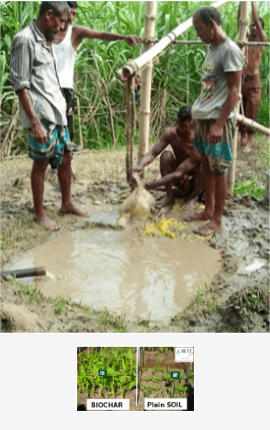Climate change is not a problem of the future. It is happening today. Climate change is referred as the long- term shifts in temperatures and weather patterns. Some climate variations are natural part of the earth’s evolution and solar cycle. However, human activities have contributed significantly to the problem mainly through burning fossil fuel such as coal, gas, and oil and by polluting the rivers and oceans with chemicals.
Burning fossil fuels generates greenhouse gases such as carbon dioxide and methane. These greenhouse gases are primarily considered to be responsible for increased global temperature and climate change. The consequences of climate change are intense drought, water scarcity, melting polar ice, rising sea levels, severe storms and hurricanes, and widespread fires. Chemists Without Borders have various programs to mitigate the effects of climate change through several societal, scientific, and educational programs.

Biochar Program
Biochar is a granular carbon substance produced by pyrolysis or thermal decomposition of organic matter in an oxygen starved chamber. The charcoal like byproduct is highly porous and completely safe for the environment.
In addition to reducing soil emissions of greenhouse gases, biochar serves many purposes in regenerative agriculture from improving soil quality, livestock feed productivity, and water filtration treatments. It offers long-term amendments that include resistance to decomposition, beneficial nutrient bioavailability in soil, soil water retention and reduction of nutrient runoff. Biochar technology offers a promising solution to mitigating climate change by reducing contamination and securely storing carbon in a cleaner and more efficient form than traditional forms of coal. One ton of biochar is equivalent to three tons of CO2 sequestered.
By turning biomass into biochar, carbon remains trapped in its solid form, thus creating a carbon-negative cycle. In practicing sustainable soil management, such as the use of biochar, the energy sectors can reduce emissions and redirect and repurpose agro-waste from landfills.
